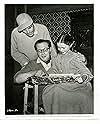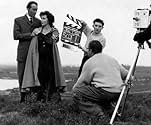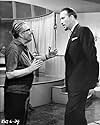Terence Fisher(1904-1980)
- Director
- Editor
- Editorial Department
Terence Fisher was born in Maida Vale, England, in 1904. Raised by his
grandmother in a strict Christian Scientist environment, Fisher left
school while still in his teens to join the Merchant Marine. By his own
account he soon discovered that a life at sea was not for him, so he
left the service and tried his hand at a succession of jobs ashore. It
was during this time that he discovered the cinema, entering the film
industry as "the oldest clapper boy in the business." One day, almost
as a lark, he applied to J. Arthur Rank Studios to become a film
editor. To his astonishment, he was accepted. In 1947, at the age of
43, he made his directorial debut with a supernatural comedy called
Colonel Bogey (1948)--a
foreshadowing of things to come.
For the next few years he switched between "A"-film assignments (Noël Coward's _The Astonished Heart (1948)_, Si Paris l'avait su (1950) with Jean Simmons and Dirk Bogarde and Le Mystère du camp 27 (1949) with Herbert Lom) and a succession of "B" films, which enabled him to support his wife and daughter. Typical of these programmers are Blood Orange (1953) and Enquête dans l'espace (1953), efficient but uninspired films that show little in the way of personality.
His break came in 1956 when, at the age of 52, he was asked to helm Hammer Studios' remake of Frankenstein (1931). The result, Frankenstein s'est échappé (1957), broke box-office records and enraged critics worldwide who were unaccustomed to its plethora of hearty bloodletting. The Eastmancolor shocker set a new standard for horror films and helped to make Fisher, Hammer and stars Peter Cushing and Christopher Lee into bankable commodities. With its emphasis on realistic character interplay over melodramatic conventions, the film established Fisher's personal approach to horror, which stood in direct defiance to the old Universal films--in fact, Fisher flatly refused to watch James Whale's 1931 version for fear that it might influence his vision.
More remakes followed. Fisher actively sought to remake Dracula (1931), and the results proved to be both aesthetically and commercially superior to "Curse of Frankenstein". Le Cauchemar de Dracula (1958) proved to be universally popular and is commonly held as Fisher's--and Hammer's--finest work. It may or may not be, but it does remain the freshest and most vibrant big-screen reworking of the story; even Francis Ford Coppola in his remake failed to recapture its vigor and sense of urgency.
Fisher's subsequent films tended to place less emphasis on shock effects and more on complex emotional interplay. For example, the titular characters of La Nuit du loup-garou (1961) and Le fantôme de l'opéra (1962) are more sympathetic than the so-called "normal" characters, while Fisher's fascinating Freudian take on the Dr. Jekyll story--Les Deux Visages du Dr Jekyll (1960)--offers a homely old Dr. Jekyll who transforms into a virile man about town named Edward Hyde. Similarly, La Gorgone (1964) disappointed schlock fans by offering a haunting story of doomed love in place of the conventional Hammer-style shocker. Following the commercial failure of "Phantom"--Hammer's most expensive film to that point--Fisher was booted out for a brief period. During this time lesser talents like Freddie Francis were entrusted with the franchises that Fisher had helped to establish. Invariably the results were inferior. Despite his hatred for sci-fi, which stood in contrast to his confessed love for horror, Fisher made good work of Les Vierges de Satan (1968) precursor The Earth Dies Screaming (1964) (with Dennis Price), while La Nuit de la grande chaleur (1967) (again with Lee and Cushing) benefited from his ability to suggest pent-up passion and paranoia.
Back at Hammer after this brief hiatus, Fisher resurrected Christopher Lee's count in the under-rated, poetic Dracula - Prince des ténèbres (1966) before detailing the further adventures of Baron Frankenstein in Frankenstein créa la femme (1967), Le Retour de Frankenstein (1969) and his last film, Frankenstein et le Monstre de l'enfer (1974). All three films offer subtle variations on the character of the Baron, played by the impeccable Cushing, thus emphasizing Fisher's unique ability to lend complex, credible characterization to seemingly formula-bound material. "Frankenstein Must Be Destroyed", an unusually bitter film which mirrors the nihilism of the late 1960s, remains Fisher's finest, most multi-layered work, despite its lack of popularity. At the center of Fisher's work is a fascinating moral dilemma: the seductive appeal of evil vs. the overzealous, frequently close-minded representatives of good. The consistency of theme in Fisher's work, coupled with a distinctive style achieved through precise framing and a dynamic editing style, refutes the idea that he was merely a hack for hire, while lending his films a recognizable signature.
Best films: "So Long at the Fair", Le Mystère du camp 27 (1949), "Dracula", La Revanche de Frankenstein (1958), La Malédiction des pharaons (1959), Les Étrangleurs de Bombay (1959), "Two Faces of Dr. Jekyll", Les Maîtresses de Dracula (1960), "Curse of the Werewolf", Le fantôme de l'opéra (1962), "The Gorgon", "The Earth Dies Screaming", "Dracula--Prince of Darkness" and "Frankenstein Must Be Destroyed".
Terence Fisher died in 1980 at the age of 76.
For the next few years he switched between "A"-film assignments (Noël Coward's _The Astonished Heart (1948)_, Si Paris l'avait su (1950) with Jean Simmons and Dirk Bogarde and Le Mystère du camp 27 (1949) with Herbert Lom) and a succession of "B" films, which enabled him to support his wife and daughter. Typical of these programmers are Blood Orange (1953) and Enquête dans l'espace (1953), efficient but uninspired films that show little in the way of personality.
His break came in 1956 when, at the age of 52, he was asked to helm Hammer Studios' remake of Frankenstein (1931). The result, Frankenstein s'est échappé (1957), broke box-office records and enraged critics worldwide who were unaccustomed to its plethora of hearty bloodletting. The Eastmancolor shocker set a new standard for horror films and helped to make Fisher, Hammer and stars Peter Cushing and Christopher Lee into bankable commodities. With its emphasis on realistic character interplay over melodramatic conventions, the film established Fisher's personal approach to horror, which stood in direct defiance to the old Universal films--in fact, Fisher flatly refused to watch James Whale's 1931 version for fear that it might influence his vision.
More remakes followed. Fisher actively sought to remake Dracula (1931), and the results proved to be both aesthetically and commercially superior to "Curse of Frankenstein". Le Cauchemar de Dracula (1958) proved to be universally popular and is commonly held as Fisher's--and Hammer's--finest work. It may or may not be, but it does remain the freshest and most vibrant big-screen reworking of the story; even Francis Ford Coppola in his remake failed to recapture its vigor and sense of urgency.
Fisher's subsequent films tended to place less emphasis on shock effects and more on complex emotional interplay. For example, the titular characters of La Nuit du loup-garou (1961) and Le fantôme de l'opéra (1962) are more sympathetic than the so-called "normal" characters, while Fisher's fascinating Freudian take on the Dr. Jekyll story--Les Deux Visages du Dr Jekyll (1960)--offers a homely old Dr. Jekyll who transforms into a virile man about town named Edward Hyde. Similarly, La Gorgone (1964) disappointed schlock fans by offering a haunting story of doomed love in place of the conventional Hammer-style shocker. Following the commercial failure of "Phantom"--Hammer's most expensive film to that point--Fisher was booted out for a brief period. During this time lesser talents like Freddie Francis were entrusted with the franchises that Fisher had helped to establish. Invariably the results were inferior. Despite his hatred for sci-fi, which stood in contrast to his confessed love for horror, Fisher made good work of Les Vierges de Satan (1968) precursor The Earth Dies Screaming (1964) (with Dennis Price), while La Nuit de la grande chaleur (1967) (again with Lee and Cushing) benefited from his ability to suggest pent-up passion and paranoia.
Back at Hammer after this brief hiatus, Fisher resurrected Christopher Lee's count in the under-rated, poetic Dracula - Prince des ténèbres (1966) before detailing the further adventures of Baron Frankenstein in Frankenstein créa la femme (1967), Le Retour de Frankenstein (1969) and his last film, Frankenstein et le Monstre de l'enfer (1974). All three films offer subtle variations on the character of the Baron, played by the impeccable Cushing, thus emphasizing Fisher's unique ability to lend complex, credible characterization to seemingly formula-bound material. "Frankenstein Must Be Destroyed", an unusually bitter film which mirrors the nihilism of the late 1960s, remains Fisher's finest, most multi-layered work, despite its lack of popularity. At the center of Fisher's work is a fascinating moral dilemma: the seductive appeal of evil vs. the overzealous, frequently close-minded representatives of good. The consistency of theme in Fisher's work, coupled with a distinctive style achieved through precise framing and a dynamic editing style, refutes the idea that he was merely a hack for hire, while lending his films a recognizable signature.
Best films: "So Long at the Fair", Le Mystère du camp 27 (1949), "Dracula", La Revanche de Frankenstein (1958), La Malédiction des pharaons (1959), Les Étrangleurs de Bombay (1959), "Two Faces of Dr. Jekyll", Les Maîtresses de Dracula (1960), "Curse of the Werewolf", Le fantôme de l'opéra (1962), "The Gorgon", "The Earth Dies Screaming", "Dracula--Prince of Darkness" and "Frankenstein Must Be Destroyed".
Terence Fisher died in 1980 at the age of 76.





































